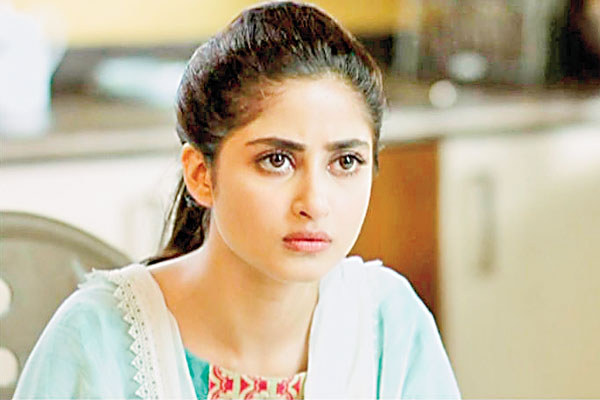Amidst a myriad of TV plays that centre upon saas-bahu disputes and familial ties, the recently concluded TV serial Gul-e-Rana stood out for its unique plot with personality conflicts and relationship dynamics forming the crux of the play. While it did not offer anything extraordinary to its viewers, often dragged at certain instances, the unpredictable ending lent the serial a different identity altogether.
Feroze Khan and Sajal Ali made Gul-e-Rana an interesting watch with brilliant performances, eventhough the story largely
feeds into existing stereotypes against women.
TVREVIEW
Though the female lead was opinionated and headstrong, the play largely depicted women as second to men when it came to the power of decision-making.
Amidst a myriad of TV plays that centre upon saas-bahu disputes and familial ties, the recently concluded TV serial Gul-e-Rana stood out for its unique plot with personality conflicts and relationship dynamics forming the crux of the play. While it did not offer anything extraordinary to its viewers, often dragged at certain instances, the unpredictable ending lent the serial a different identity altogether.
Based on Samra Bukhari’s novel Hasti Ke Ahang, the serial focused on the struggle of a young, middle-class girl, Gul-e-Rana (Sajal Ali), who loses her father, in the first episode, and subsequently moves to her paternal uncle’s house along with her mother and younger sister. There she meets her cousin Adeel (Feroze Khan), a borderline narcissist who objectifies women and is an obnoxious flirt. Unlike other girls who love to spend time with him and are more than ready to marry him, Gul-e-Rana prefers to maintain a considerable distance from Adeel. The same cannot be said about Adeel, who is desperate for Gul-e-Rana’s attention and paves way for a situation where she is forced to marry him.

From there on, the play dives into a battle of egos between the two leads, who do not spare a single chance to put each other down. While the families believe them to be a perfect match, the two are no less than enemies, embarrassing each other in front of family members, one after the other, in order to walk away with all the sympathy and glory. The last few episodes, however, saw Adeel experiencing a change of heart and sobering down his ways after a life-altering accident. But despite all efforts to make Gul-e-Rana believe in his love for her, the two end up parting ways. Adeel is seen working alone in Islamabad whereas Rana moves back to Karachi and starts teaching kids.
It sure was an unconventional ending in a rut of happy endings that see the woman forgiving all that her man has done wrong. out of sheer love, and simply because that’s what is expected out of women in our ‘society’. Adeel, who can be best defined as a physical concoction of misogyny and manipulation, is taught a lesson that there is no coming back from a life full of mistreating, undermining and disrespecting women. And that an overnight change of heart doesn’t necessarily warrant forgiveness. Who is to guarantee that what’s been done before, won’t happen again?
Despite a moralistic climax, one cannot call Gul-e-Rana a progressive play. Throughout the play, women were treated as subordinates and hardly had a say in the state of affairs. Though Gul-e-Rana was blunt and open about her views, she almost always got a shut up call from her male counterpart. Her widowed mother, who strongly believed that it is difficult to survive in our society without the support of a man, constantly advised her to work on her relationship, what come may. Even though a woman herself, she never encouraged her daughter to decide for herself.
The only thing that actually made Gul-e-Rana interesting to watch, and perhaps lent it its viral status, was the couple’s hate-fueled relationship. Their hate towards each other was evident in their arguments and vendettas and the leads pulled off the emotions brilliantly on screen. Had the performances not been as strong as they were, the play wouldn’t probably have been such a great success.
Directed by Farooq Rind, the 21-episode play that captivated viewers’ attention due to the couple’s constant conflicts, depicted impeccably by the actors, seemed to have lost the plot in the middle but made up for it with a completely unpredictable ending. That said, it did no favour to the society by only playing up on existing stereotypes.